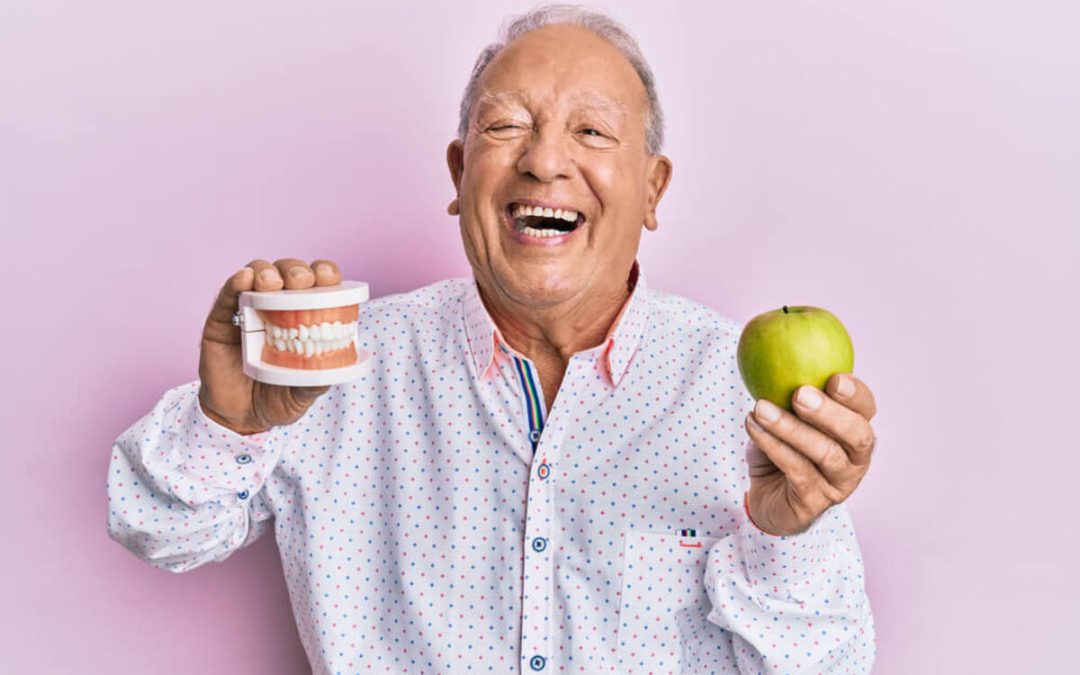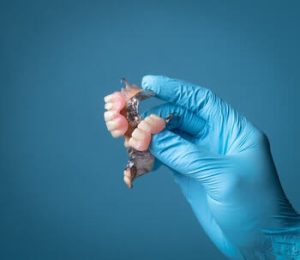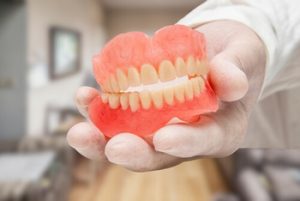Adjusting to life with dentures can take time, especially when it comes to food. While dentures are designed to restore function and comfort for those with missing teeth, certain foods can still pose challenges. Understanding the things you can’t eat with dentures helps you make informed choices, eat more confidently, and support your oral health.
Sticky Foods That Can Dislodge Dentures
Sticky treats like toffees, caramels, and gummy lollies may seem tempting, but their sticky nature can easily loosen false teeth. These foods often cling to the base or edges of your dentures, making cleaning difficult and increasing the risk of sore spots. Nut butter, especially those with a thick texture, can also be hard to manage. Denture wearers should limit these options to avoid accidental slippage. Choosing denture-friendly foods that do not pull or stick is a safer route.
Tough Meats That Require Excessive Chewing
Eating tough meats like steak or chewy roasts demands more pressure and strength than dentures are built to handle. Without the support of natural teeth, applying uneven pressure while chewing can cause discomfort or even dislodge your dentures. Instead of forcing your mouth to work harder, opt for ground meats or slow-cooked alternatives. These require less chewing and distribute pressure more evenly. If you enjoy meat, look for tender cuts or cook them until soft.
 Hard Foods That Strain Dentures
Hard Foods That Strain Dentures
Biting into hard foods such as nuts, hard lollies, or crisp apples can put stress on your dentures and gums. The rigid texture may crack or shift your dentures and make eating unpleasant. Crunchy veggie chips and popcorn pose similar risks, especially when pieces get trapped beneath the denture. Dentures feel more secure when the bite is gentle and consistent. Sticking with soft options is better for both comfort and long-term maintenance.
Crusty Bread and Thick Rolls
While fresh bread can be soft and inviting, crusty bread and hard rolls are not ideal for those who wear dentures. The tough exterior and dense texture may seem harmless, but they can strain your gums and cause sore spots. These foods also require more chewing time, leading to dry mouth if you do not drink plenty of water. Choosing mashed potatoes or mashed vegetables as a side may be more comfortable and satisfying.
Raw Vegetables That Are Hard to Break Down
Raw carrots, celery, and broccoli often top the list of healthy foods, but for denture wearers, they can be a challenge. These solid foods require a strong bite and stable teeth to break down. Instead of eating raw, consider steaming or roasting vegetables until they are soft. Mashed vegetables and ripe fruits offer a gentler alternative for those with full dentures. This shift in texture makes chewing easier and helps protect your gums.
Corn on the Cob and Other Awkward Shapes
Corn on the cob might be a summer favourite, but it presents unique difficulties for anyone wearing dentures. The act of biting directly into a cob places uneven pressure on the front teeth and risks shifting the dentures. Cutting the corn off the cob is a safer way to enjoy the same taste without the hassle. The same goes for food that requires tearing, such as jerky or hard baguettes.
Spicy Foods That Irritate the Gums
Some people who wear dentures find that spicy foods aggravate their gums, particularly if their dentures do not fit perfectly. Chilli, hot sauces, and pepper-heavy dishes can trigger irritation and leave the mouth feeling sore. The heat may also highlight sensitive spots caused by new dentures. Mild flavours are generally easier to tolerate and support more enjoyable eating experiences.
Hot Foods That Impact Denture Adhesion
Very hot food can cause two problems for denture wearers. First, heat may warp the acrylic material used in dentures if it is extreme. Second, hot food softens denture adhesives, reducing grip and making your dentures feel unstable. Allowing food to cool slightly before eating can help you maintain control and reduce any risk of discomfort or burns.
Sticky Snacks and Chewy Lollies
Sticky snacks and chewy lollies pose similar risks to other sticky foods but deserve their own mention because they are commonly reached for out of habit. Their adhesive quality can weaken the seal between dentures and gums, increasing the chances of slippage. If you are adjusting to new dentures, avoid these altogether until you are more confident. Chewing slowly and choosing smaller, manageable bites can help with transitioning to safer snacks.
Hard-to-Chew Fruits and Skins
Fruits with tough skins like apples, pears, and unripe peaches can challenge those learning to eat with dentures. Their outer layer resists the initial bite, while the inner texture varies in softness. These inconsistencies can make chewing unpredictable and increase the risk of slipping. Ripe fruits or peeled fruit slices are much easier to handle and can be added to your diet without issue.
Foods That Dry Out the Mouth
Dry mouth is a common issue for denture wearers and can be made worse by certain foods. Crackers, dry biscuits, and salty snacks absorb saliva and reduce lubrication in the mouth. Without enough moisture, it becomes more difficult to keep dentures in place. Drink plenty of water while eating and include foods with natural moisture, like soups or soft fruits, to maintain balance.
Red Wine and Its Drying Effect
While red wine is popular, it can dry out the mouth and stain dentures at the same time. The tannins in red wine reduce saliva and contribute to discomfort while chewing. If you choose to enjoy it, drink water alongside to reduce its impact. Alcohol, in general, may interfere with denture adhesion, so moderation is key for those who wear dentures regularly.
Foods with Sharp Edges or Shells
Foods like popcorn and nuts can leave behind small particles that get lodged under your dentures. These bits can cause discomfort or even small cuts if not removed quickly. Shell fragments from seafood or hard seeds also create similar challenges. Rinsing after eating and avoiding foods with hard-to-detect edges can reduce the likelihood of irritation.
 Foods That Create Uneven Pressure
Foods That Create Uneven Pressure
Some foods require a strong bite on one side of the mouth, which creates uneven pressure on the dentures. This imbalance can lead to movement, sore spots, or even long-term damage. Tough meat, crusty bread, or whole fruit like apples may force your jaw into unnatural motion. Balanced chewing and cutting foods into small bites help reduce this risk.
Overly Large Portions or Whole Bites
Trying to eat oversized bites of food may seem quicker, but it is more difficult for people who wear dentures. It places strain on the gums and increases the risk of shifting. Denture wearers should take smaller bites and chew evenly on both sides. Using a knife and fork to break food into small portions before chewing is a habit that supports long-term comfort.
Eat with Confidence by Choosing Wisely
Wearing dentures does not mean giving up flavour or variety. By understanding which foods to avoid, you can protect your gums, prevent sore spots, and enjoy meals without frustration. Whether you have full dentures or partial dentures, thoughtful food choices support your oral health and overall well-being. If you are still adjusting to new dentures or find certain foods uncomfortable, our team can help. Book a consultation today to improve your experience with dentures. Please call us on (07) 5317 1023 or (07) 5315 8076 to schedule your visit and get personalised support.
References
https://pubmed.ncbi.nlm.nih.gov/34210202/
https://www.webmd.com/oral-health/dental-health-dentures


 Hard Foods That Strain Dentures
Hard Foods That Strain Dentures Foods That Create Uneven Pressure
Foods That Create Uneven Pressure


Recent Comments